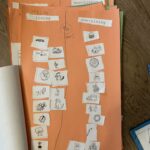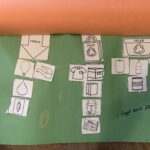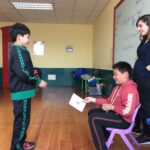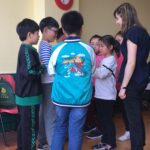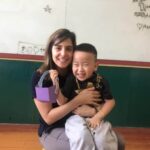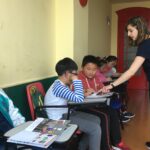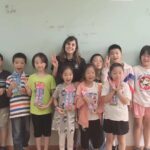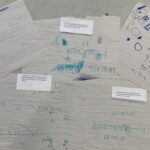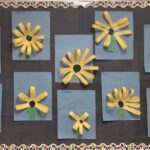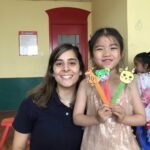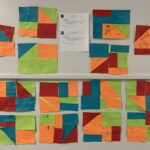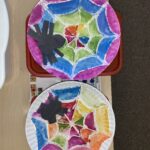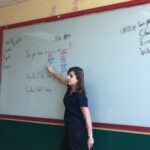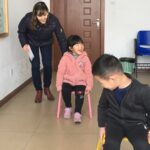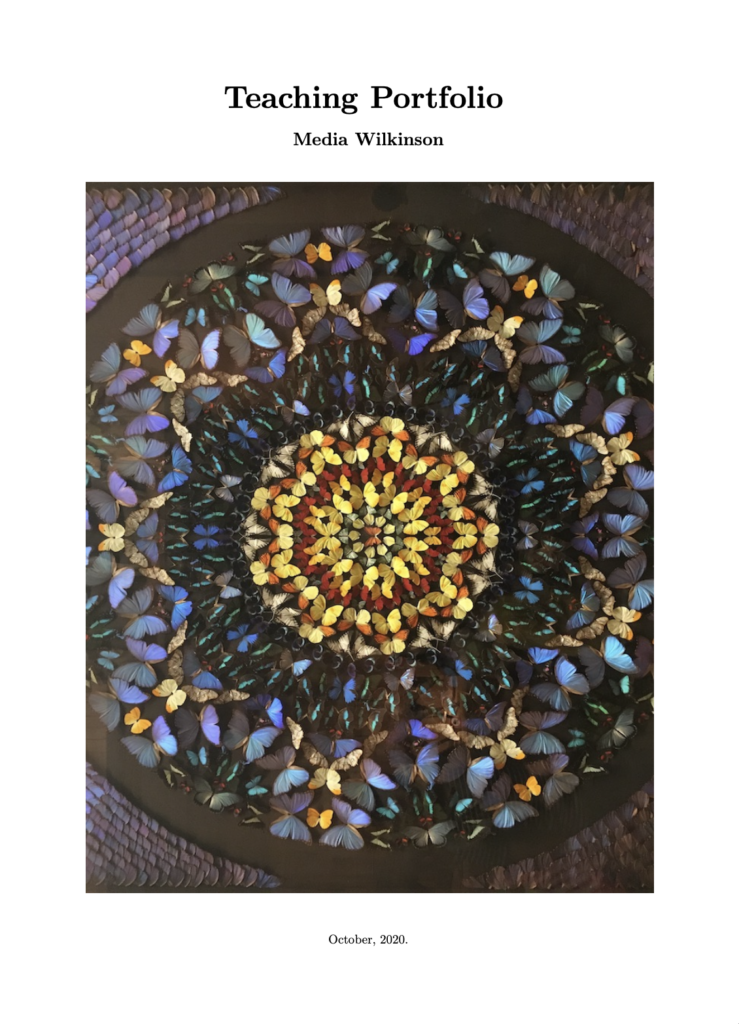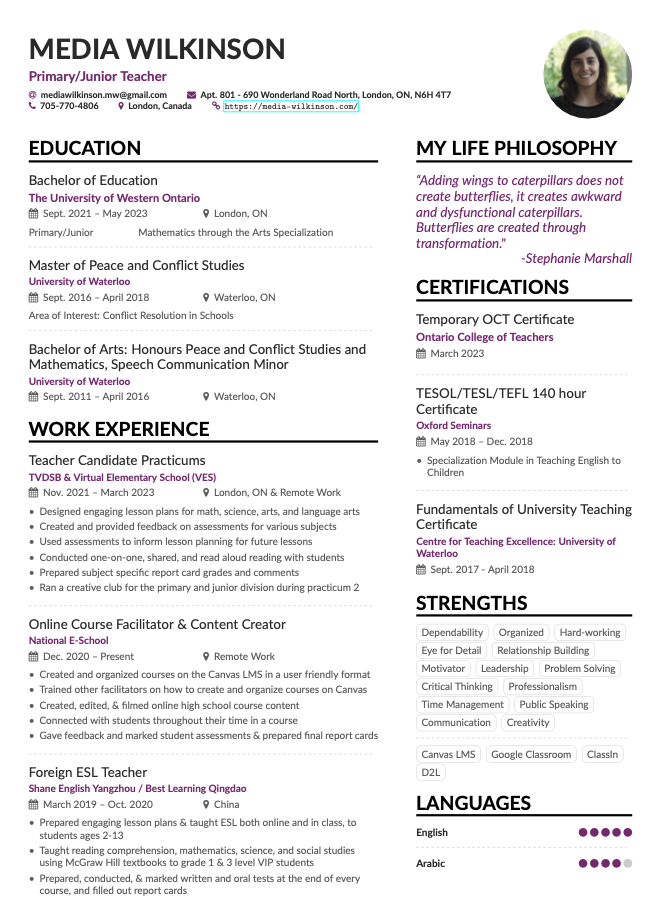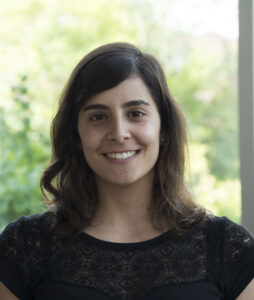
Teaching Portfolio
Educator and World Traveler
Teaching Philosophy
Why and How I Teach
The responsibility of a teacher is not just to provide students with the information they need about a subject for them to simply regurgitate that information onto an exam. A teacher’s true role is to help guide a deeper and stronger level of learning and understanding in the classroom, and to help equip students with the skills they need to operate and function as responsible and contributing citizens outside of the classroom.
My classrooms are based on respect, cooperation, and the integration of course material with the real world. In my classrooms I focus on integrating classroom material with subjects from the outside. As an example, mathematics is not necessarily everyone’s favourite subject and many students are only in math class because it is a mandatory requirement. This makes it essential that the teacher tries to integrate the course material to how it would be useful in day to day life. This integration helps students see how they are and could be using math on a daily basis and can foster new interest in the subject once students see the utility in it. Focusing on real world examples and problems can help bring a more ostensibly academic subject, like mathematics, down to earth for the students.

My classroom activities, whether for an English class or a math class always encourage team work and cooperation. I always strive to ensure that students are not only gaining knowledge and understand- ing of the subject we are discussing, but that they are also gaining important social skills. I encourage students to work with and support one another; using each other’s strengths to be successful. Having such an environment in the classroom stops students from making fun of one another for being weaker in certain areas and instead entices them to help one another so that everyone can excel and succeed. I believe in treating students with respect and ensuring that students treat me, as well as each other with respect. As such, I strongly believe that activities where students are throwing something at the teacher, pushing the teacher, or hitting the teacher – many ESL teachers use these types of activities – encourage students, especially younger students, to replicate this behaviour with other students and playmates. I believe such activities normalize violent tendencies both inside and outside the classroom, and that they do not add anything to the class pedagogically. Moreover, similar activities could be utilized to help students release energy without using the teacher or other students as targets.
In my classroom I strive to implement a deeper level of learning and understanding. I facilitate such a learning process by first finding out what background knowledge the students are coming in with and then guiding everyone in the classroom to the same knowledge level in order to move forward in a more cohesive way. This process involves me reviewing and revising my lesson plans for the class in order to ensure that all my students are able to succeed. Knowing my students and their abilities allows me to better prepare for my classes and helps me develop more creative ways to conduct my lessons to better suit everyone. Furthermore, I deepen students’ learning by encouraging students to challenge the material we are discussing, to ask open-ended questions, and to explore the content in their own way. Once we have all developed a common basis, then we are able to explore the material from different perspectives and point of views, and have more explorative dialogues and discussions about the subject at hand.
I believe being a teacher is a huge responsibility. Not only do teachers need to ensure that their students are equipped with the knowledge they need about a subject, but they also need to ensure that their students will be able to contribute to society in healthy and constructive ways. I take the role that a teacher plays in a student’s life very seriously and as such, I always strive to improve my teaching skills and to ensure my students’ success. I work hard to implement a learning environment that is based on respect, cooperation, and connection, and that integrates examples and situations from the real world. Moreover, I take the time to get to know my students and to encourage them to think more deeply about different topics. As a teacher, I am aware that my classrooms might impact my students very strongly and that it is my responsibility to ensure that the impact I make is a positive one. I believe that by positively impacting students and their lives, I am able, through them, to positively impact society as a whole.
Skills Summary
Skills and Subject Areas of Concentration

Mathematics
Anxiety centred around mathematics is a society wide problem and much of it begins in elementary schools, but this does not have to be the case! Mathematics can be intuitive, engaging, and fun; like an exciting adventure through an interesting and complex jungle with rewarding and empowering secrets to explore and discover. My formal mathematics education as well as my mathematics through the arts specialization have given me unique skills to help bring math to life for my students! By creating intuitive and engaging lessons that focus on understanding and grasping the material in concrete ways, I am able to show students that math can be intuitive and that they can be successful in their math studies. My goal is to have students leave my class with a renewed sense of exploration in mathematics and a transformed vision of themselves as evolving mathematicians!

Conflict Resolution
Many problems in life are caused and maintained because individuals are unable and at times unwilling to work to resolve interpersonal conflicts. As a teacher, I am not only explaining material and sharing knowledge with students, but also shaping their minds and helping them develop into respectful and contributing members of society. I believe that teaching students how to resolve conflicts and to respect the ideas, feelings, and life experiences of others is an essential part of education and plays a formative role in every classroom. My graduate studies, which focused on facilitating peace and conflict resolution in schools, has prepared me well for a career in teaching. Through my studies I gained a wealth of knowledge, skills, practices, and resources that I can use in my classrooms to help students to develop into conscientious and empathetic citizens with the ability to resolve conflicts and maintain relationships.

ESL
Language teachers can either hinder or advance students’ learning drastically. A successful teacher creates a safe environment for students to make mistakes, constantly pushes students to practice what is being taught, and goes above and beyond to ensure their students’ success. As an ESL teacher, I always choose activities that require the use of English as much as possible, which allows students to practice and become comfortable with the new language. I make sure to correct students’ mistakes in a positive manner and encourage students to correct their own and each other’s mistakes, which helps to transform mistakes into positive learning opportunities. My skills and experience teaching ESL abroad will also serve me will in the constantly evolving Canadian classroom setting, as multilingual learners become a larger and larger portion of the student population.
Lesson Portfolio
Sample Lesson Plans (PDFs)
Teaching, Volunteer, & Educational Outreach Experience
Work History & Highlights
Teacher Candidate Practicums
TVDSB & Virtual Elementary School (VES)
London, ON, Canada & Remote
- Designed engaging lesson plans for math, science, arts, and language arts
- Created and provided feedback on assessments for various subjects
- Used assessments to inform lesson planning for future lessons
- Managed classrooms between 16 and 29 students
- Conducted one-on-one, shared, and read aloud reading with students
- Prepared subject specific report card grades and comments
- Ran a creative club for the primary and junior division during practicum 2
Online Course Facilitator
National E-School
Toronto, ON, Canada
- Created and edited online high school course content, and filmed lecture videos
- Gave feedback and marked student assessments throughout a course
- Connected with students throughout their time in a course
- Prepared final report cards
- Created and organized courses on the Canvas LMS in a user friendly format
- Trained other facilitators on how to create and organize courses on Canvas
Foreign ESL Teacher
Best Learning Qingdao
Qingdao, SD, China
Shane English Yangzhou
Yangzhou, JS, China
- Taught English as a second language to kindergarten and early elementary students, ages 2-13
- Taught reading comprehension, mathematics, science, and social studies using McGraw Hill textbooks to a grade 3 level VIP student
- Was chosen as one of two teachers to head up an experimental class with VIP students using kindergarten and grade one textbooks in spelling and writing, math, science, and critical thinking
- Reviewed and selected the appropriate level of textbooks used for the experimental class based on students’ skills and knowledge
- Developed weekly lesson plans that aimed on making the course material more engaging and exciting to the students
- Prepared student development midterm and final presentations for parents
- Conducted and marked written and oral tests at the end of every course, and filled out report cards
Power of Ideas Tour Team Member
Perimeter Institute for Theoretical Physics
Waterloo, ON, Canada
- Traveled with a science and physics exhibit to select high schools in Southern Ontario
- Engaged with small groups of students as well as one on one in the exhibit to inform and teach them about how science works and the advances in modern physics
- Delivered physics demonstrations designed to encourage students to perform experiments and engage with the world around them
Graduate Teaching Assistant
Peace and Conflict Studies
University of Waterloo
Waterloo, ON, Canada
- Provided feedback to students on their written assignments and final exams
- Marked students’ online discussions
- Managed and released grades on the LEARN student centre
- Held meetings and e-mail conversations with students concerning grades and feedback
Volunteer Tutor
New Canadian Youth Connection Program
Community Justice Initiative
Kitchener, ON, Canada
- Supported new Canadian youth with their homework
- Worked with new Canadian youth to help improve their English language skills
- Helped youth to adjust to Canadian cultural norms and conventions
Educational Content Creator
The Ripple Effect Education (TREE)
Waterloo, ON, Canada
- Created the foundation for TREE’s Fall 2017 workshops
- Developed lesson plans for workshops to be delivered to grade 3-6 students
- Organized and created all of the worksheets and materials needed to deliver the workshops
Residence Life Don
University of Waterloo
Waterloo, ON, Canada
- Developed a positive rapport with each resident so that they felt comfortable approaching me with questions
- Ran social/community building programs for residents at least once a week
- Worked with other Dons to run quad/building/area wide events
- Led a team of first year university students in the AMPED 2013 conference
Community Volunteer
Speak English Cafe
Kitchener, ON, Canada
- Held conversations once a week with new Canadian immigrants to help them improve their English
- Taught and defined new vocabulary
Mentor
Math Faculty
University of Waterloo
Waterloo, ON, Canada
- Communicated with 16 first year students through e-mail once a week to see how their first year of university was going
- Guided students on how to solve problems by directing them to appropriate resources offered on campus
- Organized and ran the end of term event for mentors and mentees, to celebrate the mentees completion of first semester at university
Orientation Leader
Pink Tie Leader
University of Waterloo
Waterloo, ON, Canada
- Led a group of 100 first year Math students to different events around campus, which allowed the students to meet others and get familiar with the University campus
- Encouraged and motivated the students to get involved in different activities during Orientation Week
- Addressed concerns that first year students had about university life to help ease their transition into university
Education, Certifications, and Awards & Scholarships

Education
Bachelor of Education
The University of Western Ontario, London, ON
Mathematics Through the Arts Specialization
Master of Peace and Conflict Studies
University of Waterloo, Waterloo, ON
Focused on conflict resolution in schools
B. A. Honours Peace and Conflict Studies and Mathematics, Speech Communication Minor
University of Waterloo

Certifications
TESOL/TESL/TEFL Certificate
Oxford Seminars
60 hrs in class + 40 hrs online grammar course + 40 hrs
specialization module in Teaching English to Children
Fundamentals of University Teaching Certificate
Centre For Teaching Excellence, University of Waterloo
Completed 6 in-class teaching workshops and 3 mini
teaching practicums




Awards & Scholarships
Conrad Grebel University College – MPACS Award
University of Waterloo
Provost's International Volunteer Award
University of Waterloo
UW Place Programming All-Star
University of Waterloo
Student Leadership Program Certificate
University of Waterloo
Maximize Your Potential Certificate
University of Waterloo
University of Waterloo Merit Scholarship
University of Waterloo
Selected Comments
Comments on my teaching from Professional References



Learn More
Download My Resume & Detailed Teacher Portfolio
My Full Teaching Portfolio Contains:
Evidence of Teaching Effectiveness
- Practicum Feedback
- Professional Reference Letters
Teaching Strategies
- Strategies in ESL Classrooms
- Student Feedback Strategies
Professional Development
- Certifications & Programs
- Conferences, Seminars, & Workshops
Resume Contains:
- Education
- Work & Volunteer Experience
- Scholarships & Awards
- Certifications
- Strengths
- Languages
- Hobbies & Interests

